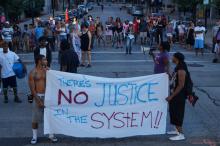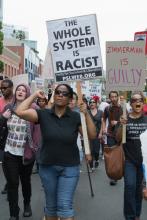stand your ground laws

In a nation built on white nationalism, keeping people fearful of the “other” is useful because it keeps up the illusion of law, order, and control — the foundations of white supremacy. Crime protection is now the dominant reason people own guns. Samuel Perry and Andrew Whitehead write in their book Taking America Back for God, that White Christian nationalists tend to want a strong military, capital punishment, and oppose gun control.
Yet again and again, Christians are commanded to welcome the stranger and be not afraid. “Do not neglect to show hospitality to strangers,” the author writes in Hebrews 13:2. “For by doing that some have entertained angels without knowing it.”

The problem is the systemic injustice inherent in Stand Your Ground laws: just feeling like you are being threatened can justify your response in “self-defense.” Under Florida self-defense laws now, someone can use even lethal force if they “reasonably believe” it is necessary to defend their lives or avoid great harm. How does a jury decide what a “reasonable person” would do under all the circumstances? Even if Dunn really believed there was a gun in the black teenagers’ car and there wasn’t one, he could still be justified in shooting into the car according to Stand Your Ground. The New York Times quoted Mary Anne Franks, an associate law professor at the University of Miami saying, “This trial is indicative of how much of a problem Stand Your Ground laws really do create … By the time you have an incident like this and ask a jury to look at the facts, it’s difficult to re-create the situation and determine the reasonableness of a defendant’s fear.” And unfortunately, the law creates an opportunity for racial factors — whether they’re conscious or not — to trump facts when even one juror who is sympathetic to a defendant’s “reasonable” fear can prevent prosecution.

Several years ago, Michael Emerson and Christian Smith criticized the quick-fix approach to racism found in the evangelical race reconciliation movement. They noted that evangelicals tended to address systemic racism through promoting interracial interactions at one-time events such as Promise Keepers rallies. Ironically, this approach tended to increase rather than decrease racism because it gave white evangelicals just enough exposure to people of color to think they now understood race without enough systemic interaction to expose them to the endemic nature of racism. They suggested instead that the preferred response was to engage in political and legal advocacy in order to change the institutional nature of racism. However, what they failed to address in that book is that political and legal approaches to race often suffer from the same quick-fix approach.
Today, we see the same quick-fix dynamics in the outcome of the George Zimmerman trial. Some are focusing again on developing interracial interpersonal relationships, while other evangelical groups have focused on legal advocacy. But in our rush to promote a “solution,” we may end up creating more harm than good. I believe evangelicals have the possibility of addressing racial injustice in a more creative way that could get more closely to the roots of the problem if we took the time to think creatively.

Oddly, I wasn't there the night George Zimmerman shot Trayvon Martin. I wasn't in the jury box either. Some commentators, like Ezra Klein and Ta-Nahesi Coates, are saying the not guilty verdict was appropriate according to Florida's "stand your ground" law. (Note that they are not saying that the Florida law is appropriate; Klein uses the word outrageous).
If this verdict was appropriate, though, what about verdicts in cases that were similar except for the color of the defendant? What happened to the "stand your ground" law when the jury reached its verdict against Marissa Alexander — an African American woman from Jacksonville, Fla.?
And anyway, why should fear of attack justify shooting to kill? It didn't in the case of John White — an African American man from Long Island, N.Y. — who shot a (white) teenager in 2006 (accidentally, he says, when the boy was trying to grab his gun).
John White, it appears, had good reason to fear the boys who showed up on his doorstep that night. That's probably why the governor commuted his sentence after he had served five months. And White no doubt should have served some time, according to New York law — his gun was unregistered, and if he hadn't been holding it when he went to the door, a scuffle probably wouldn't have escalated into manslaughter.
But, some say, the only thing that stops a bad guy with a gun is a good guy with a gun. Is this true?